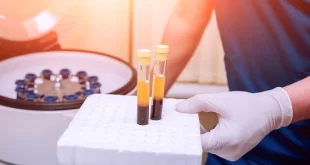Heavy periods, also known as menorrhagia, affect a woman’s physical, emotional, social, and material quality of life. Research suggests that approximately 6.5% of women aged between 12 and 51 suffer from heavy periods.
Experiencing heavy periods does not indicate a serious underlying health issue.
How to Tell if You Have Heavy Periods?
To determine if you have heavy periods, look out for these signs:
● You find yourself changing your pad or tampon every 1 to 2 hours or emptying your menstrual cup more frequently than recommended.
● You use two sanitary products simultaneously, such as a pad and a tampon.
● Your periods extend beyond seven days in duration.
● You pass blood clots larger than approximately 2.5cm (similar in size to a 10p coin).
● You experience bleeding through to your clothes or bedding.
● You avoid daily activities like exercise or taking time off work due to your periods.
● You often feel exhausted or short of breath.
If you notice these signs, it’s advisable to consult a healthcare professional for further evaluation and guidance.
What Causes Heavy Periods?
Experiencing heavy periods doesn’t always indicate an adverse underlying issue. However, in certain situations, they may point towards more significant gynaecological conditions, such as:
- Hormonal Imbalance
High levels of oestrogen or other hormones responsible for the monthly shedding of your uterus lining can sometimes lead to heavy periods.
- Endometriosis
This condition occurs when cells from the uterus lining grow outside the uterus, typically in the abdomen or other areas.
- Fibroids
These are non-cancerous growths. It develops in and around the uterus, ranging from microscopic to large sizes within the abdominal cavity.
- Pelvic Inflammatory Disease (PID)
A persistent bacterial infection spreads to the upper genital tract organs, such as the fallopian tubes, ovaries, and uterus, causing PID.
- Polycystic Ovary Syndrome (PCOS)
PCOS involves a hormonal imbalance that causes the ovaries to produce small cysts instead of eggs, often leading to symptoms like excessive hair growth and infertility.
Further, the insertion of an intrauterine contraception device (IUD) can sometimes result in heavy periods. Blood clotting disorders, liver or kidney disease, thyroid gland issues, or endometrial cancer might cause heavy periods in rarer cases.
Treatment for Heavy Periods
If heavy periods are affecting your daily life, it’s quintessential to explore treatment options. While not always necessary, there are treatments available to address this issue.
Private gynaecologists offer various treatments, including:
● Some types of birth control, such as the intrauterine system (IUS) or the combination birth control pill.
● Medications like tranexamic acid to reduce bleeding
● Prescription-only anti-inflammatory painkillers such as mefenamic acid or naproxen
It’s advisable to undergo a blood test to check for iron deficiency anaemia.
If these treatments prove ineffective or a gynaecologist in London suspects an underlying condition, they will likely refer you for further tests or specialist consultation.
What complications do heavy periods cause?
Severe heavy periods can physically and emotionally discomfort you, disrupting your daily routine.
Heavy periods can also lead to anaemia. If you bleed between periods, experience post-coital bleeding, or have heavy bleeding during menstruation, these symptoms could indicate a more severe condition requiring consultation with your doctor.
Seek medical advice if you have:
● Abnormally prolonged periods (lasting more than half the month)
● Persistent fatigue
● Feelings of faintness, dizziness, or lightheadedness
● Difficulty sleeping
● Shortness of breath
If you’re experiencing any of these, consider seeking heavy periods treatment in London to develop a bespoke approach for you.
What can you expect from heavy periods treatment?
Your gynaecologist might suggest various medications like Non-steroidal Anti-inflammatory drugs (NSAIDs), the combined contraceptive pill, which can reduce bleeding by around a third, or tranexamic acid, which typically decreases bleeding heaviness by up to half (40-50%) in most cases.
If pregnancy is not your goal, your private gynaecologist in London might recommend fitting an Intrauterine System (IUS) like Mirena. This device contains levonorgestrel hormone, released gradually to halt the lining growth in your womb. The IUS remains effective for up to five years and often improves menorrhagia within the first three to six months.
Why Choose a Private Gynaecology Clinic in London?
A Private Gynaecology Clinic in London offers numerous benefits, making it a compelling option for women’s health needs. These clinics are staffed by expert teams equipped with world-class resources, ensuring the delivery of top-notch medical care. You’ll have access to the latest treatments and advice tailored to your requirements, facilitating a quicker path to optimal health.
One standout feature of private gynaecology clinics is their exceptional patient care. The nurses, clinicians, and support teams focus on a limited number of patients. It means they can dedicate more time and attention to each individual. Throughout your journey, they will be by your side, customising your care to suit your needs and assurance that you are in capable hands.
Moreover, these clinics operate seamlessly as a unified unit, guiding you through every step of your experience. They excel in simplifying complexities, readily offering solutions and insights to any concerns you may have. Your personalised treatment plan will allow you to concentrate fully on your well-being.
If you’re facing challenges such as heavy periods or other gynaecological issues, don’t hesitate to book an appointment with an expert gynaecologist at a private clinic.
My Final Verdict
If you seek heavy periods treatment in London, first understand your options. Then, consult with experienced gynaecologists who can assess your condition thoroughly. Treatments range from medication to minimally invasive procedures like endometrial ablation. Hormonal therapies can regulate your cycle, while surgical options like hysterectomy provide a long-term solution. It’s crucial to address heavy bleeding promptly to prevent complications and improve quality of life. Stay informed about available treatments and make informed decisions with your healthcare provider.
 Stride Post Latest News
Stride Post Latest News




